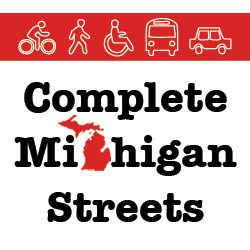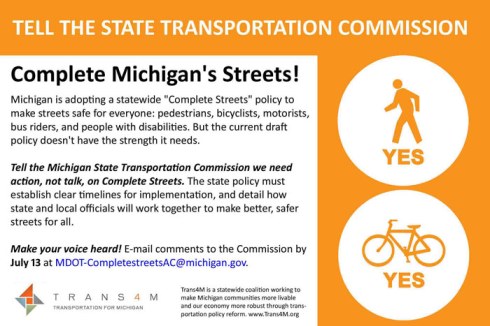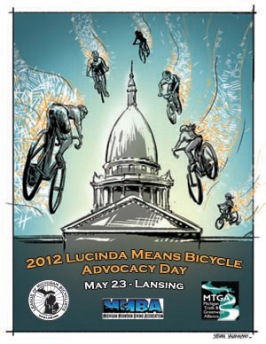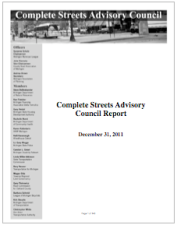You are currently browsing the category archive for the ‘Complete Streets Advisory Council’ category.
The Complete Streets Advisory Council will meet at 2 p.m., Thursday, Sept. 26, at the Capitol Commons Center, 400 S. Pine St., in Lansing. The meeting is open to the public.
The 18-member council was appointed in accordance with Public Act 135 of 2010. The group’s role, according to law, is to advise the State Transportation Commission (STC), county road commissions and municipalities on Complete Streets policies. A “complete street” refers to a roadway that provides appropriate access to all legal users, including motorists, bicyclists, pedestrians and those traveling by assistive devices, such as wheelchairs. The STC approved the Complete Streets policy in July 2012.
If you need special assistance to attend the Sept. 26 meeting, please contact Kim Young at 517-241-4819. The public also can submit comments in writing prior to the meeting to: Michelle Myers, Michigan Department of Transportation, Intermodal Policy Division, P.O. Box 30050, 425 W. Ottawa St., Lansing, MI 48909. Comments can be e-mailed to the [email protected] address.
Complete Streets Advisory Council members represent road and transit agencies, state agencies, walking and biking organizations, and environmental, senior citizens and disabled persons groups. More information is available online at: www.michigan.gov/completestreets.
On May 22nd, Governor Rick Snyder made the following appointments to the Complete Streets Advisory Council:
- Lynn Afendoulis, of Grand Rapids, is director of corporate communications for Universal Forest Products Inc., where she oversees public and investor relations, internal and executive communications and community affairs. She will represent the State Transportation Commission and replaces Linda Miller-Atkinson.
- Rob Bacigalupi, of Traverse City, is deputy director of the Traverse City Downtown Development Authority, a position he has held since 1998. Bacigalupi will represent public transit users and replaces Kelli Kavanaugh.
- Karen Kafantaris, of Grand Ledge, is associate state director of AARP Michigan, where she has worked since 2001. She is reappointed, and will continue to represent AARP.
Appointees will serve three-year terms that expire Sept. 30, 2015.
 Yesterday the State Transportation Commission (STC),a six-member board that establishes policy and plans for Michigan’s transportation department, formally adopted a Complete Streets policy. The policy will direct Michigan Department of Transportation planners to keep all users in mind – including bicyclists, transit riders, motorists and pedestrians of all ages and abilities.
Yesterday the State Transportation Commission (STC),a six-member board that establishes policy and plans for Michigan’s transportation department, formally adopted a Complete Streets policy. The policy will direct Michigan Department of Transportation planners to keep all users in mind – including bicyclists, transit riders, motorists and pedestrians of all ages and abilities.
The STC invited public comment on the draft Complete Streets policy released at its June 28 meeting in Sault Ste. Marie. Many citizens and bicycle and pedestrian advocates across the state took advantage of the public comment period to request that the policy include stronger, clearer and more specific language with firm timelines for implementation. This included a petition drive led by the League of Michigan Bicyclists (LMB), which collected nearly 2500 signatures in a single week.
We thank the STC for being so responsive to the requests made by concerned citizens. Added and/or modified language strengthened the final policy providing more clarity in a number of areas as outlined below. A big thanks also goes out to all of the Michigan Complete Streets advocates who took the time to comment on the draft policy - your voices were heard!
Public Act 135 of 2010 requires the STC to enact a Complete Streets policy by August 2012. The STC has worked closely with the governor-appointed 18-member Complete Streets Advisory Council on the draft policy. The group’s role, according to law, is to advise the STC, county road commissions and municipalities on Complete Streets policies. Council members represent road and transit agencies, state agencies, walking and biking organizations, and environmental, senior citizens and disabled persons groups.
Below is a analysis of the final policy comparing it to the major revisions requested by the LMB petition.
- Strengthen implementation language.
- Identify the procedures or guidelines that will be developed or revised. – Did not include.
- Include a timeframe by which implementing documents will be developed or revised. – Included, by December 31, 2013.
- State a commitment to continue programs to educate and train MDOT personnel and other stakeholders on complete streets implementation. – Included language about training/education.
- Include language about implementation accountability. – Included language with a bit more specificity on what MDOT will report annually to the STC, but nothing about who will be responsible for developing/revising procedures, etc.
- State a commitment to continuing to base facilities design and construction on existing laws, best practices, and guidance documents. – Included language about this.
- Strengthen exception language.
- Refer to the exceptions already outlined in PA 135. – Not specifically referenced.
- Include a timeframe by which an exception procedure document will be developed. – Included, by December 31, 2013
- Include language about developing and using performance measures. – Included language about what MDOT will report annually to the STC, which stated “any information/examples to gauge MDOT’s performance.” (Not exactly what we was requested.)
- Strengthen language to direct MDOT to work with local road agencies (change “may” to “shall”). – Language was strengthened; “MDOT shall work with local road agencies that are undertaking road or bridge projects with federal funds…”
- Amend language about the network approach to expand “non-motorized” users to include all users, including people with disabilities and transit users. – Language states “all users”
- Specify whether there will be a sunset on annual reports to the State Transportation Commission. – Not specified.
Read the final policy below or download a PDF here.
The Complete Streets Advisory Council will meet at 2 p.m., Thursday, July 26, at the Capitol Commons Center, 400 S. Pine St., in Lansing. The meeting is open to the public.
The 18-member council was appointed in accordance with Public Act 135 of 2010. The group’s role, according to law, is to advise the State Transportation Commission, county road commissions and municipalities on Complete Streets policies. The law also requires the State Transportation Commission to enact a Complete Streets policy by August 2012. A “complete street” refers to a roadway that provides appropriate access to all legal users, including motorists, bicyclists, pedestrians and those traveling by assistive devices, such as wheelchairs.
If you need special assistance to attend the July 26 meeting, please contact Debra Alfonso at 517-241-4819. The public also can submit comments in writing prior to the meeting to: Michelle Myers, Michigan Department of Transportation, Intermodal Policy Division, P.O. Box 30050, 425 W. Ottawa St., Lansing, MI 48909. Comments can be e-mailed to the [email protected] address.
Complete Streets Advisory Council members represent road and transit agencies, state agencies, walking and biking organizations, and environmental, senior citizens and disabled persons groups. More information is available online at: www.michigan.gov/completestreets
Michigan’s draft Complete Streets policy is out, and the Michigan State Transportation Commission (MSTC) is looking for your feedback. Through July 13th, we urge you to join other citizens around the state by signing the change.org petition asking MSTC to adopt a stronger policy.
MSTC, a six-member board that establishes the policy and plans for Michigan’s Department of Transportation (MDOT), recently released the draft policy for implementing Complete Streets on state roads. The Complete Streets policy will direct MDOT planners to design and maintain roadways that fit within the context of the community and keep all users in mind, including bicyclists, public transit riders, motorists, and pedestrians of all ages and abilities.
While the state’s effort is a big step in the right direction, bicycle, disability, transit, and pedestrian advocates around the state think the policy could be clearer, more specific, and include firm timelines for implementing Complete Streets procedures. Advocates analyzed the policy, comparing it to national best practices, and have identified a number of key areas where Michigan’s policy could be improved.
The draft policy is the result of Complete Streets legislation passed in 2010 with overwhelming support from Michigan Legislature and the public. The legislation requires that the state adopt a policy by August 2012. MSTC is only allowing two weeks for the public to review and comment on the policy and this period is quickly coming to a close on July 13th. That’s why we need you to ACT TODAY and sign the petition urging MSTC to make improvements to the policy before adopting it.
 Michigan officials need your input on a draft policy that could make streets in your community much safer.
Michigan officials need your input on a draft policy that could make streets in your community much safer.
It’s Michigan’s official Complete Streets policy, and through July 13, you can join other citizens around the state to send a clear message to the state:
Adopt a policy that is strong and that moves Michigan forward.
Last week, the Michigan State Transportation Commission, a six-member board that establishes the policy and plans for Michigan’s transportation department, released a draft policy for implementing Complete Streets on state roads. The Complete Streets policy will direct Michigan Department of Transportation (MDOT) planners to design and maintain roadways that fit within the context of the community and keep all users in mind, including bicyclists, public transit riders, motorists, and pedestrians of all ages and abilities.
While the state’s effort is a step in the right direction, most bicycle, disability, bus, and pedestrian advocates around the state think the policy could be clearer, more specific, and include firm timelines for implementing Complete Streets procedures.
Without clarity and timelines most feel that the policy could become just another document that sits on a shelf in Lansing.
Michiganders have made it clear. They want safe and convenient transportation choices. And they want better, safer, and more Complete Streets.
To make sure Michigan adopts a strong policy, here’s how you can get involved:
Read the 2-page DRAFT Complete Streets policy here.
Please send an email to the Michigan State Transportation Commission and tell them how you feel about roads in your local community.
Here’s the email address: [email protected]
In your note, please tell them that you want a complete streets policy that:
- Establishes clear internal timelines and specific procedures that the Department, must adopt;
- Commit to training Department staff and other stakeholders on Complete Streets implementation, and;
- Directs state officials to use best practices while working with local officials and stakeholders on best practices to make better, safer streets for all.
Spread the word on Facebook:
Please “like” and “share” Trans4M’s Facebook postcard. Include the caption:
Michigan is adopting a Complete Streets policy and we think it can be better. Tell the Michigan State Transportation Commission that we need a stronger Complete Streets policy! http://bit.ly/MU9HJv
Let’s move Michigan forward!
Please “like” and “share”
To learn more about Complete Streets in Michigan, check out the Michigan Complete Streets Coalition website: http://michigancompletestreets.com
Let’s move together to complete Michigan’s streets!
Stand up for Complete Streets and the preservation of non-motorized funding at the 2012 Lucinda Means Bicycle Advocacy Day on May 23rd.
Bicyclists and Complete Streets supporters will meet with members of the Michigan Legislator on May 23rd at the State Capitol to advance legislative priorities aimed to make Michigan a more bicycle-friendly state. The event will be hosted by the League of Michigan Bicyclists, Michigan Trails and Greenways Alliance and Michigan Mountain Biking Association. All non-motorized transportation advocates are encouraged to participate.
Their Advocacy Agenda (PDF) includes a number of items such as establishing vulnerable roadway user designations for bicyclists, pedestrians and wheelchair users to create enhanced penalties for drivers who injure or kill a vulnerable roadway user. Advancing bikes-on-trains is another top priority. Roll-on bike service would allow cyclists to take bicycles on-board Michigan Amtrak trains, making multi-modal travel easier in Michigan. This would extend Complete Streets principles of connectivity further than a communities geographic boundaries by linking local bicycle networks and passenger rail service.
Also included in the Advocacy Day agenda are a few bills that are raising the eyebrows of Complete Streets advocates across the state. SB 921 (Ouiment) and HB 5304 (Jansen) were both recently introduced as part of Governor Snyder’s transportation funding reform proposals. Language in these bills, needlessly eliminates the Michigan Complete Streets Advisory Council (MCSAC). The Council, comprised of representatives from 18 statewide government and non-government stakeholder agencies, was created as a result of Public Act 135 of 2010. It is charged with providing education and advice to the State Transportation Commission (STC), county road commissions, municipalities, interest groups, and the public on the development, implementation, and coordination of Complete Streets policies.
To date, the MCSAC has focused its efforts solely on drafting recommendations for the STC regarding the statewide policy for MDOT. As a result, little guidance has been provided to local units of government across the state.
While Michigan leads the nation with the most adopted Complete Streets ordinances and resolutions (over 70 in total), many communities are still hesitant to advance Complete Streets until the MCSAC provides further recommendations. The MCSAC provides valuable oversight and guidance for the effective implementation of Complete Streets throughout the state. Dissolving the MCSAC will create an unfortunate void for communities seeking to make their roads and streets safer for all users. The collective expertise of MCSAC should continue to be utilized as MDOT and local communities work to implement the finalized policy.
Another bill of concern is HB 5303, which removes a funding requirement from Act 51 that obligates communities and road agencies to spend a minimum of 1% of their transportation funding on essential non-motorized transportation projects.
Worse yet, HB 5303 includes provisions that reward funding to road agencies based on the number of Vehicle Miles Traveled (VMT) under their jurisdiction. This creates disincentives for investments in alternative transportation options such public transit systems and bicycle networks.
The bill penalizes communities and road agencies for making systemic improvements like “road diets,” a popular technique that reduces the number of travel lanes on roads designed to carry more vehicle traffic than they do in reality. A common “road diet” improvement converts four-lane roads that have lower traffic volumes into two-lane roads that also include center turn lanes and additional safety features such as bike lanes, creating new transportation options without causing additional congestion.
You can learn more about these issues and register for the 2012 Lucinda Means Bicycle Advocacy Day at www.LMB.org/advocacyday.
The Complete Streets Advisory Council will meet at 2 p.m., Thursday, April 26, at the Capitol Commons Center, 400 S. Pine St., in Lansing. The meeting is open to the public.
The 18-member council was appointed in accordance with Public Act 135 of 2010. The group’s role, according to law, is to advise the State Transportation Commission, county road commissions and municipalities on Complete Streets policies. The law also requires the State Transportation Commission to enact a Complete Streets policy by August 2012. A “complete street” refers to a roadway that provides appropriate access to all legal users, including motorists, bicyclists, pedestrians and those traveling by assistive devices, such as wheelchairs.
If you need special assistance to attend the meeting, contact Dorothy Thompson at 517-241-4890. The public also can submit comments prior to the meeting via e-mail to [email protected].
Complete Streets Advisory Council members represent road and transit agencies, state agencies, walking and biking organizations, and environmental, senior citizens and disabled persons groups. More information is available online at: www.michigan.gov/completestreets
The Complete Streets Advisory Council met yesterday and announced the release of an annual report detailing progress made since Complete Streets legislation went into effect in Michigan on Aug. 1, 2010. The report is available online at: www.michigan.gov/completestreets or can be viewed in the PDF viewer below.
The Complete Streets law was enacted to encourage counties, cities, villages and townships to work cooperatively to incorporate policies that ensure that roads and streets take into account the mobility needs of all legal users, including bicyclists, pedestrians and those traveling by assistive devices such as wheelchairs. Public Acts 134 and 135 of 2010 also requires the State Transportation Commission to enact a Complete Streets policy for MDOT by August 2012.
The 18-member council worked together over the last year to develop a vision statement and sample policy language for the State Transportation Commission. The report released yesterday notes that 63 Michigan communities have enacted Complete Streets policies and/or resolutions as of November 2011, putting Michigan ahead of all other states.
Members of the Complete Streets Advisory Council represent road and transit agencies, state agencies, walking, biking and environmental organizations, senior citizen and disabled persons groups. The council’s role, according to law, is to provide education and advice to the State Transportation Commission, county road commissions and municipalities. More information is available online at: www.michigan.gov/completestreets.
The Complete Streets Advisory Council will meet at 2 p.m., Wednesday, January 25, at the Capitol Commons Center, 400 S. Pine St., in Lansing. The meeting is open to the public.
The 18-member council was appointed in accordance with Public Act 135 of 2010. The group’s role, according to law, is to advise the State Transportation Commission, county road commissions and municipalities on Complete Streets policies. The law also requires the State Transportation Commission to enact a Complete Streets policy by August 2012. A “complete street” refers to a roadway that provides appropriate access to all legal users, including motorists, bicyclists, pedestrians and those traveling by assistive devices, such as wheelchairs.
If you need special assistance to attend the meeting, contact Dorothy Thompson at 517-241-4890. The public also can submit comments prior to the meeting via e-mail to [email protected] or in writing to:
Michelle Myers,
Departmental Specialist
Intermodal Policy Division
Michigan Department of Transportation
P.O. Box 30050, 425 W. Ottawa
Lansing, Michigan 48909
Complete Streets Advisory Council members represent road and transit agencies, state agencies, walking and biking organizations, and environmental, senior citizens and disabled persons groups. More information is available online at: www.michigan.gov/completestreets
















